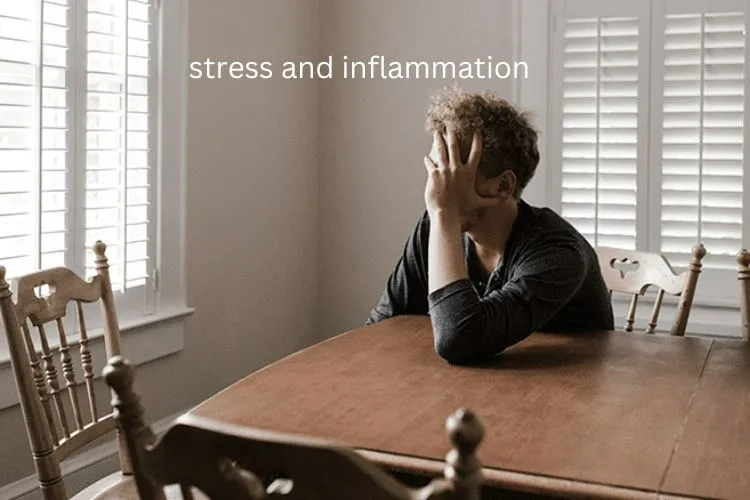Connection Between Stress and Inflammation

What is Stress?
Stress is a normal reaction to everyday pressures, but can become unhealthy when it upsets your day-to-day functioning. According to the American Psychological Association(APA), Stress is the physiological or psychological response to internal or external stressors. A mental, ecological, or biological stressor can cause stress, which is a condition of endangered equilibrium. All in all, Stress is a sensation of strain and tension in the body and mind.
Stress can take a toll on your physical and mental health. Our online psychologist at Ganeshaspeaks.com can help you address your stress.
What is Inflammation?
Higher organisms developed the inflammatory response as a protection mechanism against infection and damage. In order for the body to remove the damaged tissue’s components and to start healing, it serves to both localize and get rid of the harmful substance. For survival, it is necessary.
Inflammation is the body’s response to a wide range of risks, which includes not only infections but also allergies, stress, anxiety, and physical trauma. There are two types of inflammation: Acute and Chronic. Acute inflammation is the initial response of the body to harmful stimuli. Chronic inflammation is also known as Prolonged inflammation.
Interplay Between Stress and Inflammation
You might wonder about certain things such as: are Stress and Inflammation really interconnected? What happens with the body when we are stressed? Can stress cause inflammation in the body? Why do stress and anxiety cause inflammation? Are stress and inflammation in various parts of the body linked? Can mental health affect physical health and vice versa? The answer to all these questions is yes! There is a link between all of these and it is proven by various researchers.
The term Psychosomatic refers to the link between mind and body. This means that a physical illness or condition can be caused as a result of aggravated internal conflict of the mind. Negative thoughts or their ramifications, such as stress, aggression, or deprivation, might trigger inflammatory processes.
Chronic stress raises cortisol levels over normal physiological levels, altering its effectiveness to regulate inflammatory and immune responses. Inflammation develops into a stress response when the body recovers.
A collection of inflammatory diseases that affect the small intestine and colon are collectively referred to as “Inflammatory Bowel Disease”. There is mounting evidence that associations between the immune system and the psychological system play an essential role in inflammatory bowel disease. The stomach is impacted by psychological stresses in a number of different ways. Stress is known to enhance bacterial translocation and the development of toxins, both of which result in low-grade intestinal inflammation.
Stress can also cause joint pain and inflammation. Studies have shown that inflammation is the root cause of “Rheumatoid Arthritis”, a condition in which the immune system of the body destroys joints and tissues, resulting in stiffness and discomfort. Cytokines, which are molecules generated during times of stress, contribute to the inflammation in RA. Therefore, while under stress, your body releases higher amounts of these chemicals, which causes greater inflammation. The prerequisite to reducing our body’s inflammatory reaction is to change how we respond to stress.
How to reduce stress induced inflammation?
Studies have shown that in order to reduce the inflammation induced by stress, it is essential to target and combat stress or at least control its levels. An imbalance between the generation of reactive oxygen species (free radicals) and antioxidant defenses is known as oxidative stress. Lifestyle and dietary measures such as the ones given below can help to regulate stress levels and eventually reduce inflammation.
- Exercise: The healthiest way to tackle stress levels is to exercise regularly. Breathing exercises, pranayama, and Surya namaskar have been found to be a few of the most effective exercises.
- Meditation: Practicing mindful meditation can help to reduce stress. Research conducted by Raison regarding mindfulness training has shown that when health interventions and mindfulness were introduced in making people feel better emotionally, mindfulness in combination with meditation reduced inflammation in the skin.
- Nutrition: Reduce the intake of sauces and sugar in your diet. Instead, try relying on spices more. Use turmeric, ginger, and cinnamon in your diet. Reduction of caffeine intake can reduce joint pain that’s caused due to increased levels of stress. Staying hydrated is the most common yet effective solution.
- Sleep: Sound sleep is a potent stress buster. Maintaining a regular sleep schedule relaxes and rejuvenates the body, enhances focus, controls mood, and improves judgment and decision-making.
- Social Interaction: Humans are social animals. According to studies, persons with strong social ties have less inflammation compared to those who don’t.
- Seek help: It’s important to know that you’re not alone. If you feel stressed and are having a hard time dealing with it then it’s okay to ask for help.
“Take care of your mind, your body will thank you. Take care of your body, your mind will thank you.” – Debbie Hampton
What is the thing that gives you stressed or not sure about addressing your stress? talk to our best online therapist at www.GaneshaSpeaks.com and reduce stress-induced inflammation.
Talk to Online Therapist
View All










